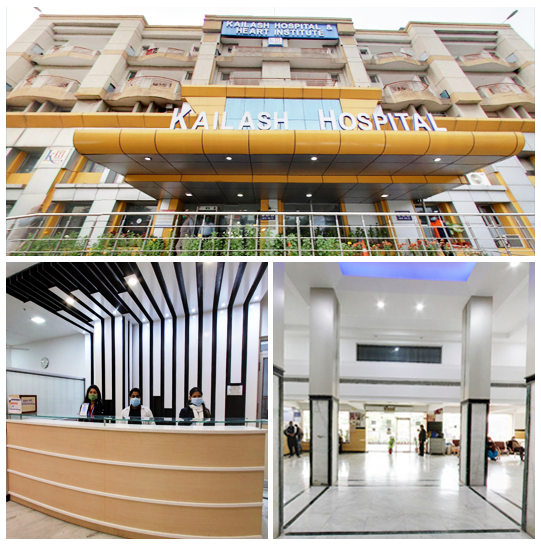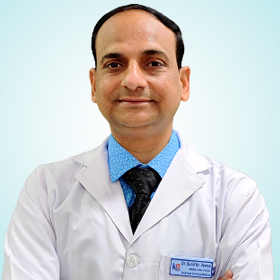

Transfusion Medicine (Kailash Hospital, Sector 27, Noida)
The departments of Blood Transfusion Services assure the supply of as much as possible safe and good quality of blood and its components to the patients and provide high quality services.
Elimination of transfusion transmitted diseases and transfusion of safe blood. To maintain quality of blood and blood products, voluntary donors are taken. In private blood banks, where blood donation camp is not permitted by Government of India, the immediate family members are considered as replacement donors.
Apart from carrying out all mandatory tests (VDRL, Malaria, HIV I&II, HbsAg and Hepatitis C virus as laid down by the Drug Controller of India for licensed Blood Banks, Kailash Hospital also conducts Hepatitis B core Antibody (Anti HBcore IgM + IgG) on every unit of blood to make the blood safer for transfusion.
The department runs round the clock and blood and its components are supplied as and when requested
Why should you donate blood?
The annual requirement of blood in NCR and in neighboring areas is about 5, 00,000 units of blood, and all blood centers collect about 3, 50,000 units of blood. That means there is shortage of blood about 1, 50,000 units of blood every year. The blood center of this hospital needs about 50 blood donors every day to meet the transfusion need of patients at this hospital. With increase in population and development of more advanced medical and surgical procedures, the need of blood is ever increasing. There is no substitute for blood. Only blood donors can help to maintain adequate supply of blood to save the lives of those who need it.
You can help the blood center to meet the need of blood by donating blood yourself and motivating your friends / colleagues to donate blood and by becoming regular voluntary blood donor.
Who can Donate Blood?
- A blood donor must be in good health
- Age between 18 to 60 years
- Weight about 50 kg or more
- Hemoglobin level at least 12.5 g/dl
- It is safe to donate blood every three months
- Persons with high risk behavior for having AIDS and who had jaundice (Hepatitis B or C) should exclude themselves from blood donation
Blood Donation Procedure:
Blood donation is simple harmless and painless procedure and consists of:
- Registration
- Medical examination; blood is taken if the person is medically fit
- Simple laboratory tests- Hemoglobin estimation is done before donation
- Blood is withdrawn with sterile and disposable needle in bags. There is no chance of getting any infection by donating blood.
- Actual blood donation takes 8-9 minute
- Refreshment some drink is given after donation and donor is advised to rest for 8-10 minutes
Services Provided:
- Screening of blood for transfusion-transmitted disease - p24 HIV and anti-HIV 1 & 2 by ELISA by fourth generation test
- Red Cells serology - tests for ABO , Rh(D) group & Du (weak D) in Rh negative donor
- Antibody screening for complete and incomplete antibodies
- Antihuman globulin test - manual and Gel technology
- Titer of complete antibodies in saline
- Titer of incomplete antibodies by antihuman globulin test (I.D. Gel technique)
- Compatibility test is done both for complete & incomplete antibodies
- Compatibility test for incomplete antibodies is done by Coombs' test (I.D.Gel Technology)
- Adverse reactions of blood transfusion are investigated
- Blood Components Available:
- Leukocytes-reduced Packed red blood cell (LR-PRBC)
- Packed red blood cell (PRBC)
- Platelet concentrate (RDP & SDP)
- Fresh Frozen Plasma (FFP)
- Cryoprecipitate
- HBV (HbsAg) by ELISA
- HCV (anti-HCV) by ELISA
- Syphilis
- Malaria
Leukocytes-Reduced Blood Components
Donor leukocytes present in cellular blood components are linked to wide range of transfusion adverse reactions mainly non-hemolytic reactions (FNHTR), HLA alloimmunization, platelet refractoriness, transfusion related acute lung injury (TRALI).
Techniques for preparing leukocytes reduced components are:
- Semi-automated method (using quadruple bags)
- Pre-storage leukocytes-reduced blood component are prepared in blood bags with inline integral leukocytes-depletion filter
- Apheresis
Leukocytes - Reduced/Depleted Red Blood Cells
- Red blood cells leukocytes reduced to log 1 (85-90%) prepared by removing Buffy coat and stored in additive solution Adsol for 42 days
- Pre-storage red blood cells leukocytes-depleted to log 3-4 (99.9 –99.99%) prepared by removing Buffy coat and filtering red blood cells through inline leukocytes depletion filter and stored in SAG-M additive solution for 42 days
Platelet Concentrates
- Preparation of random donor platelets from Buffy coat - platelet yield is = 6-7X 1010 and leukocytes reduced to Log 2 (2 X107 e.g. 95%) in one unit of platelets
- Platelet Apheresis – Platelet yield is 5-7X 1011, leukocytes reduced to log 3 (99.9%), Plasma 200-300 ml
Fresh Frozen Plasma (FFP)
- 180 –200 ml in one unit, leukocytes-reduced
- Can be kept in frozen state (FFP) at – 300 to - 400C for 1 year
Cryoprecipitate (Factor VIII):
Prepared on the specific demand from fresh frozen plasma.
Apheresis
What is Apheresis?
Blood has several components, including red blood cells, platelets, plasma and stem cells. Apheresis is special type of donation in which a specific component, viz. platelets, gametocytes (white cells) plasma or stem cells are withdrawn from a donor using a special equipment called Cell Separator: the remaining components are returned into donor’s blood circulation. It is very safe
What is the advantage of Apheresis?
Random Donor Platelet concentrate prepared from one unit of whole blood contains less number of platelets. For therapeutic dose of platelets for an adult patient 6-8 units of random donors platelets are required, while one unit of platelets prepared by apheresis is sufficient. Besides platelets prepared by apheresis are leukocytes reduced. Thus there are less chances of transfusion transmitted-infections and platelet refractoriness with the use of platelet apheresis.
The following procedures of Apheresis are done:
- Platelet Apheresis (SDP)
- Granulocytes Apheresis
- Therapeutic plasma exchange
Team of Doctors
© 2025 Kailash Healthcare Ltd. All Rights Reserved











